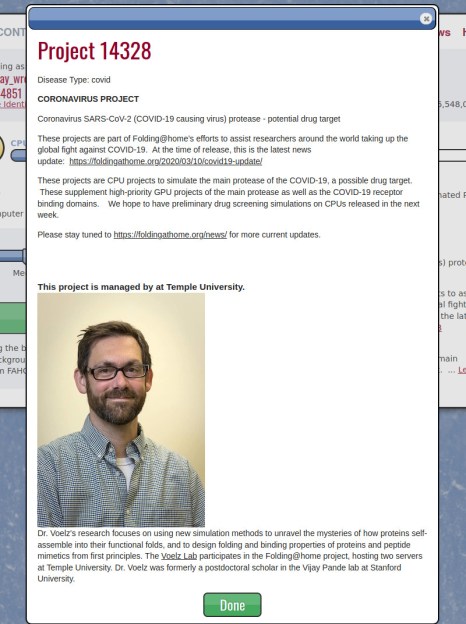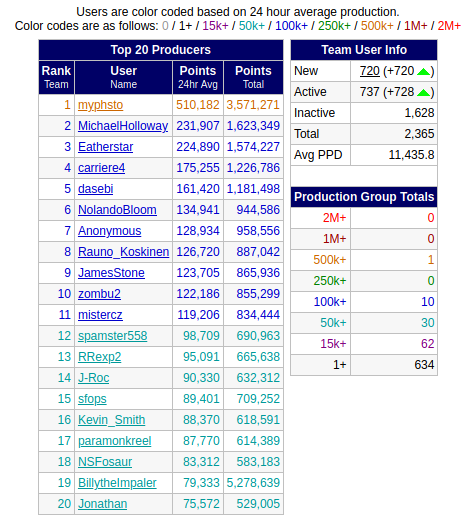On Wednesday morning we asked the Hackaday community to donate their extra computer cycles for Coronavirus research. On Thursday morning the number of people contributing to Team Hackaday had doubled, and on Friday it had doubled again. Thank you for putting those computers to work in pursuit of drug therapies for COVID-19.
I'm writing today for two reasons, we want to keep up this trend, and also answer some of the most common questions out there. Folding@Home (FAH) is an initiative that simulates proteins associated with several diseases, searching for indicators that will help medical researchers identify treatments. These are complex problems and your efforts right now are incredibly important to finding treatments faster. FAH loads the research pipeline, generating a data set that researchers can then follow in every step of the process, from identifying which chemical compounds may be effective and how to deliver them, to testing they hypothesis and moving toward human trials.
First, here's the rundown on how easy it is to set your computer up to help with Folding@Home's Coronavirus effort:
Okay, let's answer some questions! First up, does this actually make a difference?
Folding@Home Has a Record of Producing ResultsThe Folding@Home project started back in 2000. Much has been accomplished over the course of the past 20 years and I encourage you to go and read the lengthy Examples of application in biomedical research section of the Wikipedia page which takes an in-depth look at the impacts.
The effort has identified drug therapies for Alzheimer's and Huntington's diseases, it's been used in drug design for combating HIV and influenza (both are viral), and is used to study how cancer mutates. Now we have the chance to apply that to the COVID-19 virus. On an explain-it-like-I'm-five level, scientists are trying to simulate every possible combination of protein folding patterns, looking for locations that would let medicine grab hold and do some good.
It's a huge challenge, similar to trying every combination on a padlock, but this lock takes a mind-bogglingly large number of combinations. Research scientists highlight where the most likely solutions lie, then use the mind-bogglingly huge power of the Folding@Home network and sets to work running the simulations. How powerful is the FAH network? Wikipedia lists it at 470 petaFLOPS as of early March 2020 which means 416 quadrillion floating point operations per second. That's 416 million billion math problems solved every second!
But here's the best part of all of this, the project is non-profit and makes the data freely available to other researchers upon request.
Can I Make Sure My Computer Only Works on the COVID-19 Problem? No, but you don't need to since the group is already prioritizing the coronavirus effort. Although the software does offer the option to work on a specific area of research, COVID-19 is not specifically listed. That is likely because this pandemic is fast moving and it's not worth trying to push a new version of the software just to add this setting. For now, leave this on the default of "Any" and your computer will work on COVID-19 whenever there are Work Units (WU) available.
No, but you don't need to since the group is already prioritizing the coronavirus effort. Although the software does offer the option to work on a specific area of research, COVID-19 is not specifically listed. That is likely because this pandemic is fast moving and it's not worth trying to push a new version of the software just to add this setting. For now, leave this on the default of "Any" and your computer will work on COVID-19 whenever there are Work Units (WU) available.
You can use the built-in web interface found at http://localhost:7396/ to see what problem your computer is currently working on. Here you can see the "Learn more…" screen from currently running instance. This week I have only seen one time that my computer was working on a different project.
My Computer is Set Up, Why is it Idle Right Now?The FAH servers dish out those WUs as fast as they can, but right now the network is growing as more people add their computers to the network. When all of the staged WUs run out, your computer will be idle until more become available. This has nothing to do with you, project maintainers are working to keep this buffer full.
Will This Lead to a Vaccine?I'm not an expert but I believe the answer is that this research seeks to identify pharmaceutical treatments and a better understanding of how the protiens in the virus work. This is not necessarily in pursuit of a vaccine.
 This is still incredibly important, it means that researchers are looking for drugs that can be used to treat patients who have the virus. Right now, COVID-19 is really good at evading our body's natural defenses — our immune system. If drug therapies are discovered that weaken the virus, it may lead to our immune system having a foothold to fight the infection.
This is still incredibly important, it means that researchers are looking for drugs that can be used to treat patients who have the virus. Right now, COVID-19 is really good at evading our body's natural defenses — our immune system. If drug therapies are discovered that weaken the virus, it may lead to our immune system having a foothold to fight the infection.
We need both a vaccine and drug therapies — consider the example of the seasonal flu where we have vaccines to protect people from infection and antiviral drugs to treat at-risk populations who have been infected. Research into both should be, and is, running in parallel.
Use #44581 for Team HackadayThis effort is gamified, so join your fellow hackers on Team Hackaday by using team #44851 when you configure your Folding@Home software. When we first published, we had 21 active team members, by Friday afternoon there were 737. Can we make that 7000 by the end of the week?

 Peter Suciu has been an ECT News Network reporter since 2012. His areas of focus include cybersecurity, mobile phones, displays, streaming media, pay TV and autonomous vehicles. He has written and edited for numerous publications and websites, including Newsweek, Wired and FoxNews.com.
Email Peter.
Peter Suciu has been an ECT News Network reporter since 2012. His areas of focus include cybersecurity, mobile phones, displays, streaming media, pay TV and autonomous vehicles. He has written and edited for numerous publications and websites, including Newsweek, Wired and FoxNews.com.
Email Peter.

